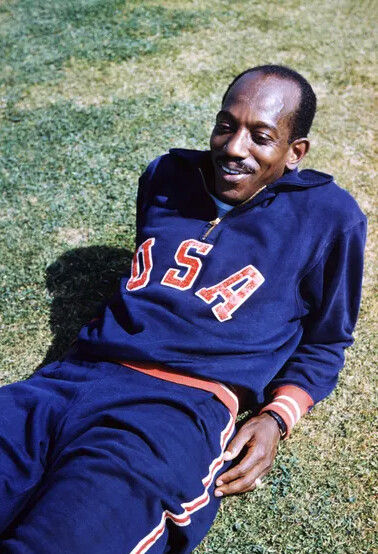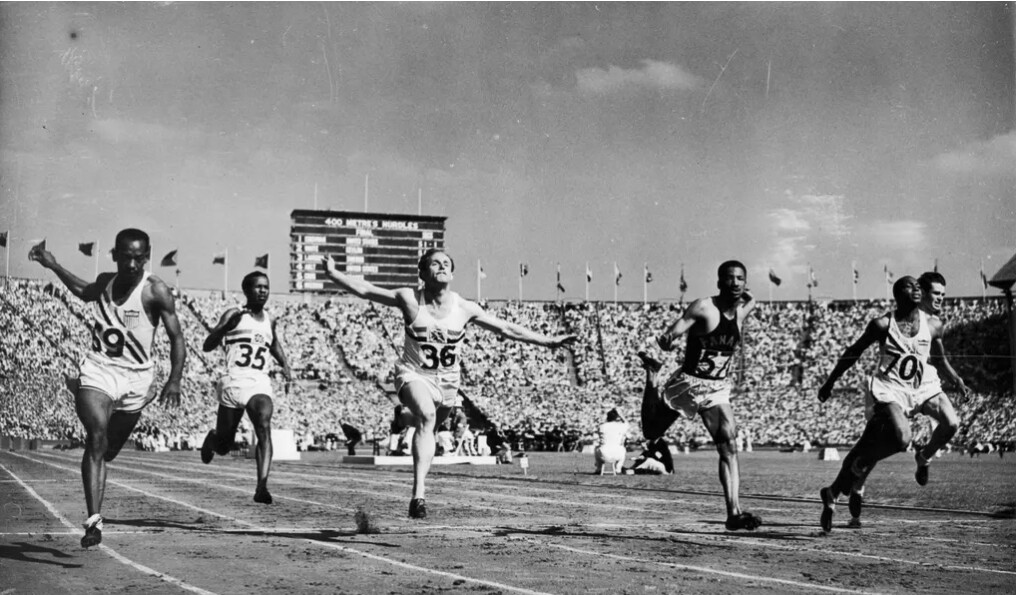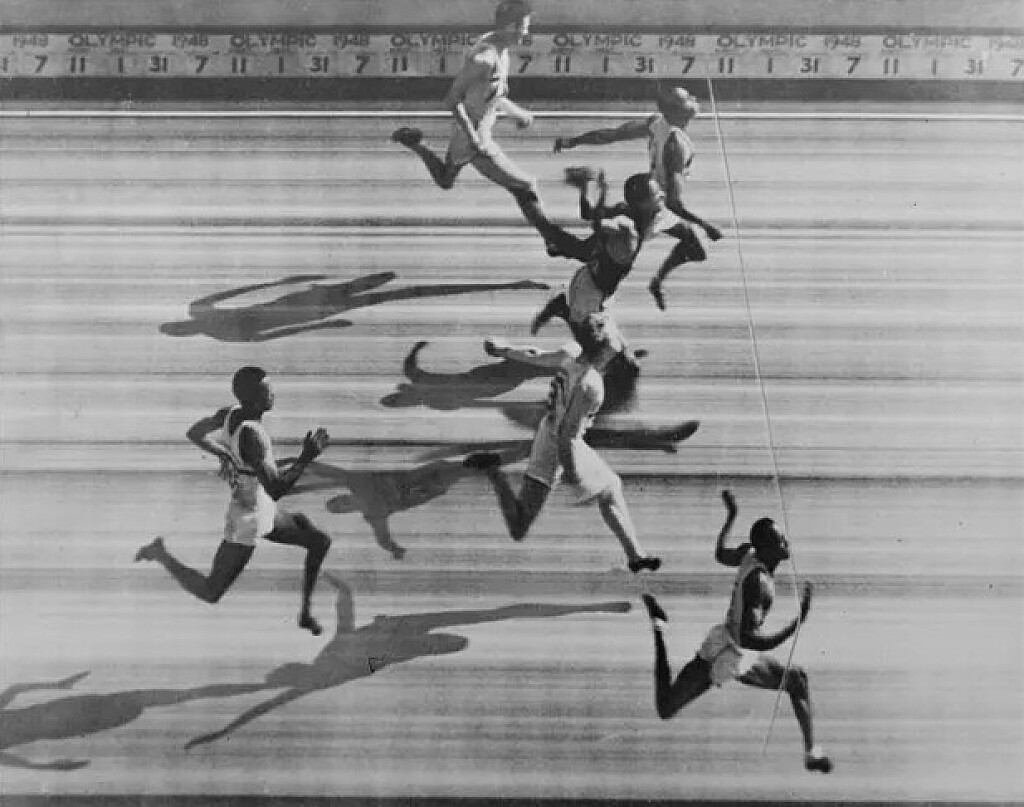Running News Daily
Running News Daily is edited by Bob Anderson. Send your news items to bob@mybestruns.com Advertising opportunities available. Train the Kenyan Way at KATA Kenya and Portugal owned and operated by Bob Anderson. Be sure to catch our movie A Long Run the movie KATA Running Camps and KATA Potato Farms - 31 now open in Kenya! https://kata.ke/
Index to Daily Posts · Sign Up For Updates · Run The World Feed
Going once, going twice … gold! Men’s 100m Olympic medal up for auction
Harrison Dillard took gold at the London Games in 1948 and this weekend, nearly 75 years on, that medal is up for sale
Harrison Dillard should never have won the 1948 Olympic 100 metres gold medal on a blazing July day at Wembley Stadium. He shouldn’t have been in the final. This weekend, that gold medal is up for sale.


He entered the event at the American trials to sharpen his speed work for the high hurdles, his specialist event. Back then, the 25-year-old Clevelander was the greatest sprint hurdler the world had seen and had racked up 82 consecutive wins before the trials and held the world record of 13.6sec in the 120-yard hurdles. He was deemed unbeatable. Then catastrophe struck.
“All I had to do was finish third and I was in the team,” he said. “But on that particular day, as history shows, I finished dead last. I hit the first hurdle, got over the second and then hit every other hurdle in succession, stopping completely at the eighth. I had totally lost the rhythm of the race and my timing was so completely destroyed I just stopped and didn’t even finish.
“Here I was, the world record-holder and American champion and it all went for naught because under the American system you qualify on that day or you don’t make it at all.”But he had managed to squeak third spot in the 100m, so he was able to join the US team on the boat to London for what became known as the austerity Games, a unifying moment of hope and spectacle for the British public in a city scarred by six years of war and blighted by strict rationing.
The skinny Dillard, 143lb soaking wet and known to his teammates as “Bones”, then ran the race of his life to win one of the closest 100m finals in Olympic history.
The Omega photo finish camera, used for the first time at the Games, captured the inches that separated Dillard, running on the outside lane, and the US No 1, Barney Ewell, in Lane 2, who was so convinced he had won the race he bounded almost halfway around the track before realising the result had not gone his way.
On a cinder track, in front of 83,000 spectators, Dillard had posted a time of 10.3sec, with Ewell second in 10.4sec and Panama’s Lloyd LaBeach third. Scot Alistair McCorquodale was fourth, with the 100 yards world record-holder, Mel Patton, plagued once again by big competition nerves, fifth, and Britain’s highly fancied McDonald Bailey last.
“To see the flag, the Stars & Stripes, as it goes up the flagpole while the national anthem is playing, with the medal around your neck, that’s when I think it really hits you,” he said. “I remember the hair standing up on the back of my neck as I stood to attention in that proud and particular moment. I don’t think I teared up, but I felt terrific emotion.”Nearly 75 years on, his medal, along with other Olympic medals, is in the Ingrid O’Neil Olympic auction, in California. The estimate is somewhere north of $120,000 (£92,000). Olympic gold medals at auction are as rare as hen’s teeth and this is reckoned to be the first men’s 100m gold to come up for public sale. The big hope is one of the grander museums, either the Olympic Museum in Lausanne or the History Center in Cleveland, will acquire it and display it to the public. But the pandemic has played merry hell with museum budgets, so no one is sure where it will go or what price it will fetch.
What would Dillard have made of it all? He would certainly have taken it all with a customary big smile and in that very large stride of his. He was a charming, humble and articulate man who won the hearts of everyone he met.
He served in the second world war as one of the Buffalo Soldiers, a segregated black division who fought their way through Italy in some of the toughest battles of the conflict. He hardly mentioned it. Or the fact that none other than General George S Patton said, after watching Dillard win four events in a postwar GI track meet, that he was “the best goddam athlete I’ve ever seen in my life”.But he did love that he had emulated his childhood idol and fellow Cleveland high-schooler Jesse Owens. Dillard marvelled at the modern sprinters, especially Usain Bolt, but well into his 90th year he said: “Jesse and I could have taken him, if we trained real hard.”
His daughter Terri decided to sell the 100m medal – the first of four golds Dillard won at the 1948 and 1952 Olympics – but the other three will stay in the family. “It was a tough call to make but I’m hoping it will go to someone who will appreciate and honour it. Hopefully a museum where it can be on display.
“My dad never kept the medals on display at home, but he’d always get them out if anyone asked. My mother actually put one of them on a gold chain for him and he’d wear it sometimes.”After the 100m triumph in London, he collected another gold in a controversial sprint relay (the US team won, was disqualified, protested and was reinstated), then went back into training for the Helsinki Games of 1952. He chose not to defend his 100m title, but to set the record straight in the 110m hurdles, running an Olympic record of 13.7sec to take gold and collected another in the relay.
He retired from the track after failing to make the US team for the 1956 Melbourne Olympics, working first in the back office of the Cleveland Indians baseball club, before forging a long and successful career with the Cleveland Board of Education.
He was always a popular visitor to big track meets around the world and returned to London in 2012 to watch Bolt claim his second Olympic sprint title. Cleveland mourned when he died, in November 2019, at the age of 96.
Login to leave a comment




